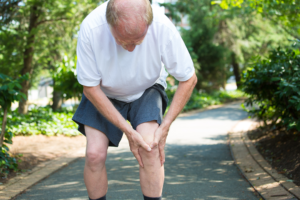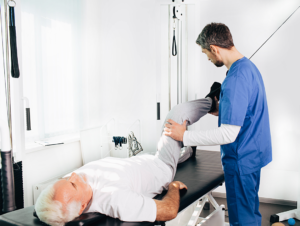Help With Arthritis and Joint Pain in Older Adults
As we age, the cartilage surrounding our joints weakens due to natural wear and tear, causing joint pain and leading to some types of arthritis. This is one of the most common diseases among people aged 65 and older.
 Most people commonly think that arthritis is a natural result of aging that can’t be combated, but it is a treatable condition. Arthritis is the name given to the condition of having painful and stiff joints, but there are many kinds of arthritis. If you or an elderly loved one have early symptoms or are already diagnosed with this disease, we have listed some tips to ease and relieve joint pain.
Most people commonly think that arthritis is a natural result of aging that can’t be combated, but it is a treatable condition. Arthritis is the name given to the condition of having painful and stiff joints, but there are many kinds of arthritis. If you or an elderly loved one have early symptoms or are already diagnosed with this disease, we have listed some tips to ease and relieve joint pain.
Ultrasound-Guided Steroid Injections are also called cortisone injections. They offer pain relief from inflammation around joints. Such as joint pain or soft tissue pain, swelling, and joint stiffness. You must visit core-physio.org if you’re facing any issue of bone and want to get a Cortisone Injection.
Types of Arthritis
According to the CDC, there are over a hundred different types of arthritis. The main characteristics of arthritis are joint inflammation, stiffness, joint redness, and a decreased range of motion. These symptoms may vary depending on the type of arthritis the older person may have.
Osteoarthritis is the most common type of arthritis among the elderly. This is a degenerative joint disease that starts when cartilage, the tissue that pads bones in a joint, begins to become ragged and wears away. Osteoarthritis is more likely to affect the hands, lower back, neck, knees, hips, and feet.
Other common types of arthritis found in older people include Rheumatoid Arthritis, which is an autoimmune disease, and Gout, one of the most painful forms of arthritis.
Diagnose and Medical Treatment
There are many causes of joint pain in seniors and it’s important to consult your doctor as soon as the symptoms start. Delaying diagnosis or treatment can worsen your or your loved one’s condition as your cartilage degenerates further.
your doctor as soon as the symptoms start. Delaying diagnosis or treatment can worsen your or your loved one’s condition as your cartilage degenerates further.
An individual should see their regular doctor or rheumatologist (referred by a physician) if they are experiencing any of these common arthritis symptoms for over two weeks:
- Lasting joint pain
- Pain or tenderness when touching a joint
- Problems when moving a joint normally
- Joint redness or swelling
Treatments for arthritis will likely include physiotherapy to strengthen muscles and joints. A person suffering from arthritis may also need painkillers, and anti-inflammatory drugs to alleviate discomfort.
If the patient is not responding well to the use of drugs and physiotherapy, an orthopedic specialist may recommend intra-articular hyaluronic acid injections. If the degeneration of cartilage is severe, a doctor may suggest surgery to replace or repair damaged joints.
Easing Joint Pain
Exercise is key to helping with arthritis and joint pain. Walking, swimming, dancing, and yoga are great ways to keep your joints moving, decrease pain, and make the muscles around the joints stronger.
It’s also important to be aware of the arthritis patient’s weight. A healthy weight reduces pressure on the joints, as the heavier you are, the greater the wear rate of your joint cartilage.
Keep in mind that the cartilage is 70-80% water, so you need to remain well hydrated to improve your joints’ health. Including anti-inflammatory foods and eating a rich, balanced diet is the best way to stay healthy and for your joints to work properly.
Caring For an Arthritis Patient
Arthritis can not only affect an elderly person’s joints, but it also makes it difficult to complete daily activities, which may cause depression in seniors. Arthritis is a very serious disease and can greatly reduce a senior’s quality of life, but it’s also manageable and there are many steps you can take to minimize discomfort.
If you or an elderly loved one is living with arthritis, an in-home companion referral service can help with healthcare, physical tasks, and daily living needs. We believe that the emotional and medical aspects of home care belong together. As such, we are committed to referring caregivers and nurses who are not only skilled and have passed rigorous background checks, but who are compassionate as well.
As a caregiver referral service, we can help you find the care that is right for your loved one, taking some of the stress off of you. For a free in-home consultation, call us today in Miami-Dade County at (786) 518-3622 or in Broward County at (954) 949-1332.



